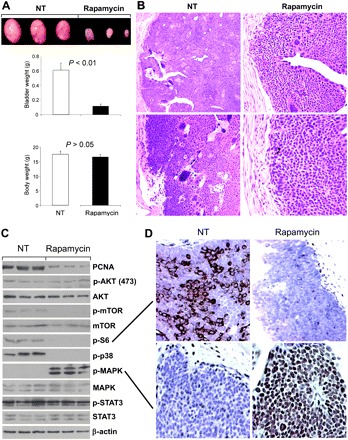Fig. 5.

Effects of AKT-mTOR pathway inhibition by rapamycin. (A) Three-week-old Ras*/SV40T double transgenic mice were treated with solvent only (NT; n = 8)) or that containing rapamycin (n = 8) via intraperitoneal delivery every 2 days for a period of 2 weeks. Values were means ± SD. Note the dramatic reduction in bladder (tumor) weights in the rapamycin-treated group. (B) Hematoxylin and eosin-stained bladder cross sections of untreated (NT) and rapamycin-treated double transgenic mice showing the reduced tumor size and tumor cell number in mice receiving rapamycin. Magnification: left panels, ×50; right panels, ×100. (C and D) Responses of signaling effectors to rapamycin treatment in Ras*/SV40T transgenic mice. (C) Western blotting of urothelial proteins extracted from untreated (n = 3) and rapamycin-treated (n = 3) mice. Note the marked inhibition of mTOR and its downstream effector S6 kinase, the inhibition of p38, the unchanged STAT3 and the significantly elevated phosphorylated MAPK. (D) Immunohistochemical staining of untreated and rapamycin-treated mice using antibodies against phosphorylated S6 and MAPK showing the inhibition of the former and marked induction of the latter. Magnification: ×200.
